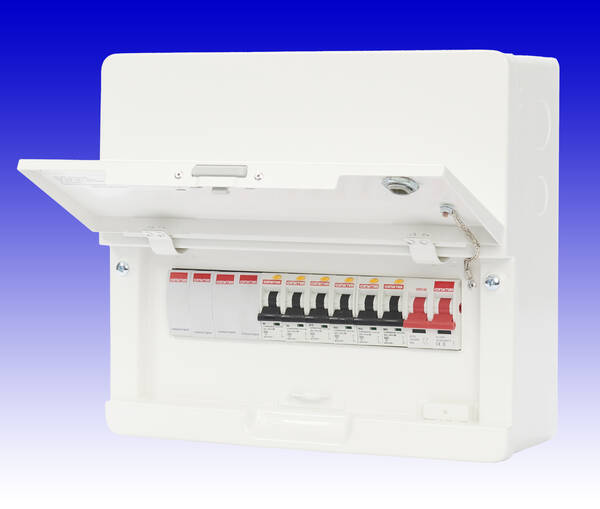Discovering the most up to date Developments in RCBO CONSUMER UNITS Modern Technology
Discovering the most up to date Developments in RCBO CONSUMER UNITS Modern Technology
Blog Article
The Role of Customer Systems in Efficient Power Administration Solution
Customer systems are essential to reliable energy monitoring systems, offering as the main circulation factors for electric power within structures. The advent of clever innovations has actually better enhanced their functionality, enabling for real-time data monitoring and nuanced energy consumption evaluation.
Comprehending Consumer Devices

Understanding the function of customer systems starts with acknowledging their necessary feature in protecting electric systems. By isolating mistakes within particular circuits, customer devices protect against widespread outages and possible fire risks. This seclusion is accomplished via using circuit breakers that trip or integrates that impact when a mistake is detected, consequently removing the electrical circulation to the impacted circuit.
Additionally, customer systems assist in the well organized distribution of power, improving the performance of power usage. They allow for the systematic monitoring of electrical loads, which can be particularly essential in commercial and industrial settings where need can fluctuate dramatically. Appropriately maintained consumer units contribute to the longevity of electric systems and assist in lessening downtime triggered by electric failures, inevitably sustaining the seamless procedure of energy-dependent facilities.
Smart Technologies Combination

A crucial advantage of clever customer units is their capacity to take advantage of progressed algorithms and artificial intelligence for predictive analytics. This permits for preemptive changes based on usage patterns, weather forecasts, and various other variables, considerably boosting overall performance. Smart consumer devices facilitate demand reaction programs, where energy usage can be dynamically adjusted throughout height periods to support the grid and lower costs.
The combination of renewable resource sources, such as solar and wind, is likewise structured with wise customer systems. By intelligently taking care of the intermittency of these sources, these systems make certain a trustworthy and balanced energy supply. Furthermore, clever customer devices boost customer interaction by providing comprehensive insights and remote capabilities with mobile applications, fostering an extra positive strategy to power conservation and sustainability.
Surveillance Power Consumption
Structure on the abilities of clever modern technologies combination, monitoring power intake comes to be an important emphasis within power administration systems. By leveraging sophisticated metering infrastructure (AMI), real-time data on power use can be gathered at granular degrees, giving beneficial understandings right into usage patterns and peak demand periods.
Smart meters and Net of Things (IoT) tools play a pivotal function in this surveillance process. These devices can track power use in real-time, transferring information to centralized systems for analysis. The accumulated information is then processed with sophisticated formulas to find abnormalities, forecast future intake, and suggest optimization strategies. Additionally, cloud-based options use scalable platforms for keeping and examining huge datasets, assisting in remote tracking and control.
The combination of these modern technologies not only encourages customers with in-depth information about their power here usage however also sustains utility companies in managing load distribution extra efficiently. Inevitably, specific and constant surveillance is indispensable for attaining power efficiency, price savings, and sustainability goals within energy administration systems.
Optimizing Device Usage

One efficient technique involves recognizing peak and off-peak hours to move energy-intensive tasks, such as laundry or dishwashing, to times when energy demand is lower. This not only lessens strain on the grid yet likewise capitalizes on lower energy tariffs. Furthermore, incorporating artificial intelligence formulas enables predictive upkeep, making sure appliances operate at ideal efficiency and extending their life expectancy.
Power monitoring systems can also integrate user-specific choices and actions to tailor home appliance usage routines. Smart lights systems can change brightness based on occupancy and natural light schedule, while HVAC systems original site can maintain convenience degrees without too much energy use.
Supporting Sustainability
Promoting sustainability within energy management systems entails not only boosting performance yet additionally cultivating environmentally accountable techniques. Customer systems are important to this procedure, as they provide real-time information and control mechanisms that enable users to keep track of and minimize their power usage. By leveraging advanced modern technologies, consumer units can recognize energy-saving possibilities and assist in the assimilation of renewable resource sources like solar and wind power.
One important aspect of promoting sustainability is informing customers on the advantages of liable power use. Through comprehensive understandings supplied by customer devices, individuals can make informed choices that lessen their carbon footprint. These systems can advise optimum times for operating high-energy appliances based on grid need and eco-friendly power accessibility, thus lowering dependence on fossil gas.
Additionally, customer units support the adoption of clever grid innovations, which boost the overall performance and dependability of power circulation. By making it possible for two-way interaction between web link customers and energy suppliers, these systems can dynamically adapt to energy needs, decreasing waste and advertising the use of lasting energy practices.
Verdict
Consumer units, as essential components of energy monitoring systems, dramatically boost electrical safety and effectiveness within structures via circuit security and wise innovation assimilation. Real-time information tracking and analysis promoted by these systems optimize energy intake and appliance use. Furthermore, the incorporation of renewable resource resources advertises lasting methods, adding to minimized total energy usage and reduced carbon impacts. Customer devices play a critical role in advancing both energy efficiency and ecological sustainability.
Developments in smart innovations have actually changed the capacities of energy administration systems, specifically via the assimilation of wise customer units.Building on the capabilities of clever modern technologies assimilation, checking power intake comes to be a critical emphasis within power management systems.Effective device usage optimization is a crucial component of energy monitoring systems, intending to enhance efficiency and minimize unneeded energy intake.Consumer systems, as indispensable components of power administration systems, dramatically enhance electrical security and effectiveness within buildings with circuit defense and wise modern technology combination. In addition, the unification of renewable energy sources advertises lasting techniques, contributing to lowered general power intake and reduced carbon impacts.
Report this page